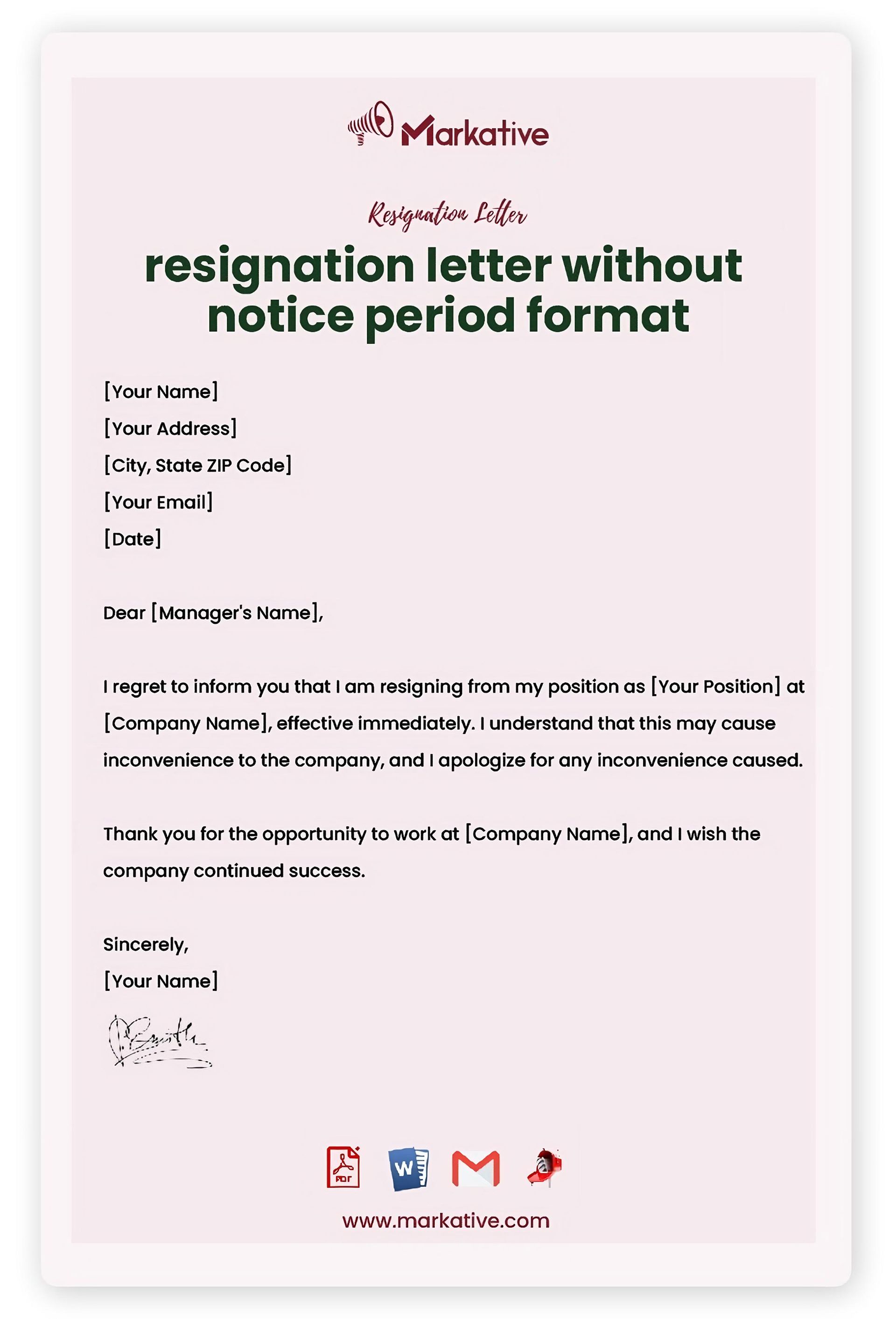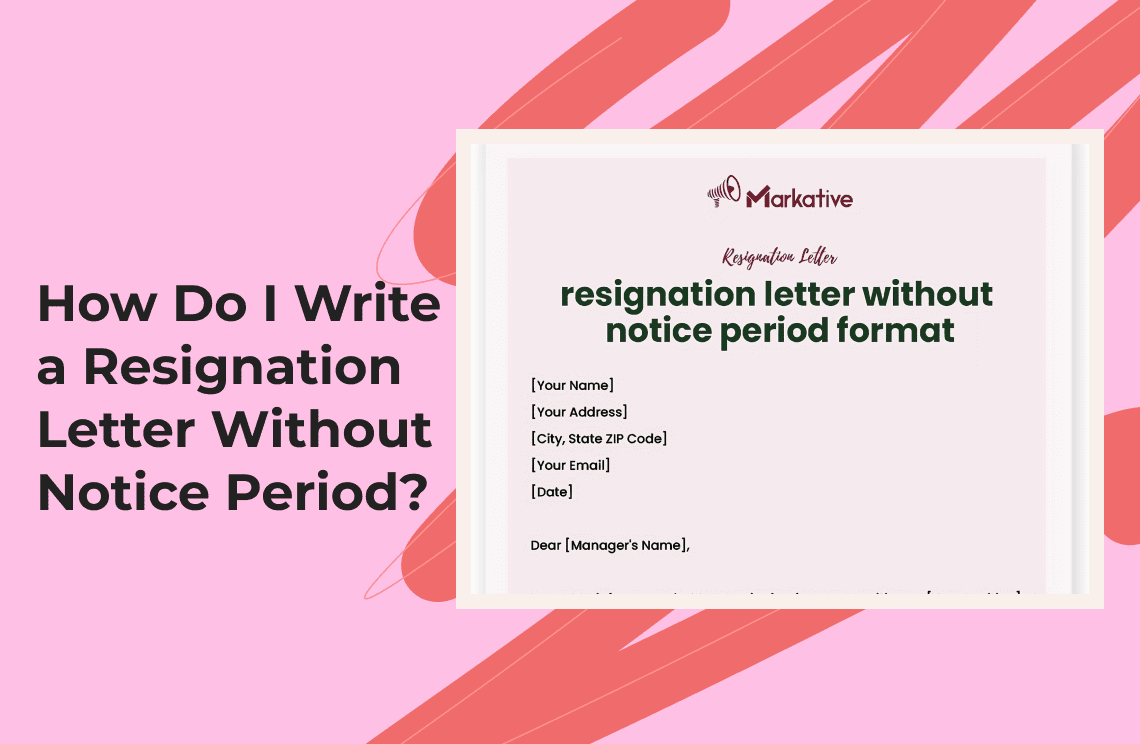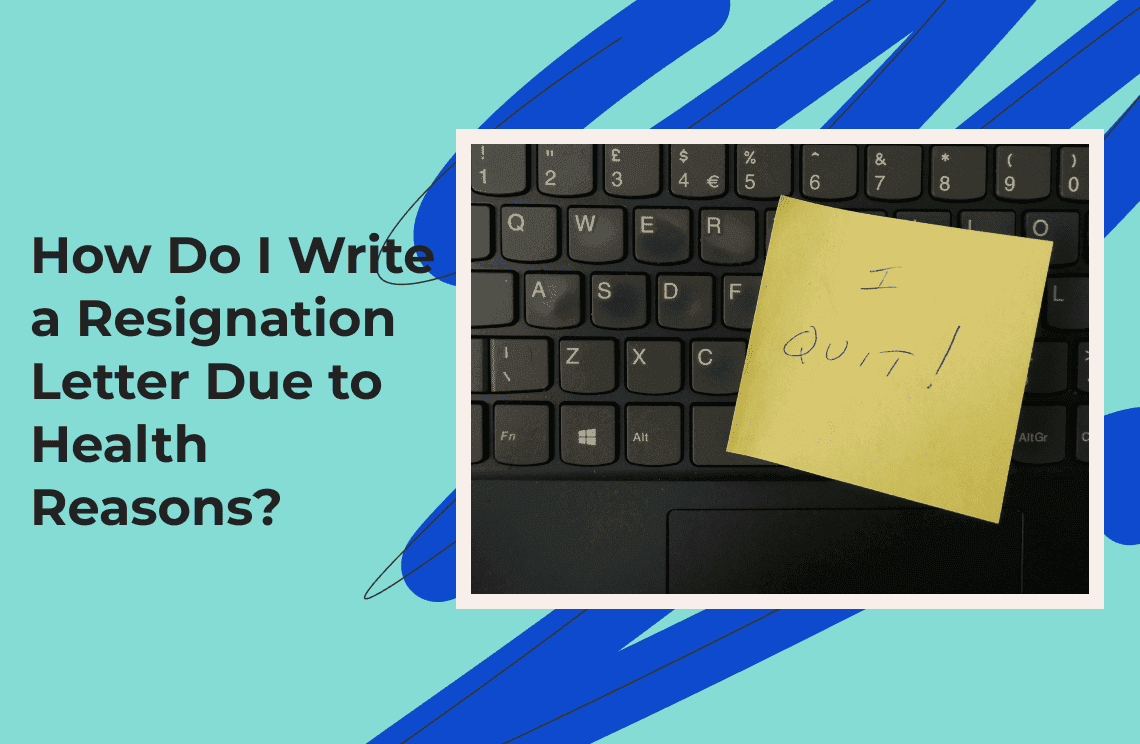Leaving a job is sometimes not easy; it's even worse when the circumstances around you force you to quit on the spot without giving notice. Whichever the reason—whether personal emergencies, health issues, or other unexpected situations—write a job resignation letter that is professional in content and demeanor, maintaining your reputation and relationships in the workplace. You must submit a resignation letter as. However, you can write a resignation letter without notice period, especially if you have to resign in an emergency. If you land a new job and need to resume immediately, writing a resignation letter with a notice period may be difficult because of the time constraints.
A resignation letter serves as a formal notification to your employer about your intent to leave the company. Even when resigning without notice period, providing a written letter is important for several reasons:
- Documentation:
- A resignation letter serves as an official record of your decision to leave the company, ensuring clarity and creating a referenceable document for both you and your employer for any future employment-related matters or disputes.
- Professionalism:
- Submitting a thoughtfully written resignation letter reflects professionalism and respect for your employer and colleagues, showing your gratitude for the opportunity and helping maintain positive relationships as you transition to the next phase of your career.
- Future References:
- Leaving on good terms through a formal resignation letter helps preserve relationships with employers and colleagues, ensuring you can rely on them for recommendations or references that may benefit your career opportunities in the future.
How do you write a resignation letter without a notice period? Continue reading for answers.
When Can One Quit a Job Without Notice?
Even though it is highly recommended that a two-week notice be provided, there are instances when one must quit immediately. Common examples include:
- Personal or family crisis: Situations that need attention right away, such as serious health complications or family emergencies.
- Unconducive work environment: If you are in a hostile or unsafe work environment that may be destructive to your well-being.
- Health conditions: Physical or mental health conditions that prevent you from continuing in your job.
- Unethical practices: Being asked to engage in illegal or unethical activities.
- Breach of contract: If your contract of employment has been breached by your employer.
Tips for Writing a No-Notice Resignation Letter
- Be direct and concise: State, forthwith, that you are resigning immediately without going into excessive detail on why you are resigning.
- Use a professional tone: Regardless of whatever happened, the tone of the letter should be professional.
- Express gratitude: Thank your employer for the opportunities you have had during your time at their company.
- Offer assistance: If possible, offer to help with the transition process or to complete any outstanding tasks before your departure.
- Keep it brief: Avoid lengthy explanations; focus on the essentials.
Steps to Follow When Writing a Resignation Letter Without Notice
Begin with a concise statement: You should start writing the resignation letter with clear statements that will enable the reader to grasp all your points with ease. Tell them categorically in the letter that you want to resign but will not be serving them the notice period. You should equally mention the date your resignation will start taking effect. For instance, you can write as follows: “I am using this medium to notify you of my resignation as a Sales Manager at your company (you can also state the company’s name) and the resignation will be effective instantly”.
Show some gratitude: You have been working in the company for some period and have gained some experiences or learned new things. You should make space for gratitude to your employer and colleagues in the resignation letter, thanking them for the knowledge gained, the support given and the opportunity provided to learn new things while working at the organization. Your resignation letter must be respectful and positive all through.
Tell them the reason for resignation: Courtesy demands that you state your reason for resigning from the organization in your resignation letter. It is essential to be honest while stating your reason. The reason should also be brief to avoid taking too much space. The reason stated should let them know why you resigned without providing a notice period. Do not blame anyone and stay glued to professionalism in the process.
Declare readiness to assist: Bear in mind that the transition process from you to the person to occupy your position may be challenging for the organization. State in your resignation that you will be available to assist with the transition process. You can also provide them with your contact details so that they can reach you easily if they need such assistance from you.
Conclude with a positive note: Include in the resignation letter that you wish the organization the best in its future endeavors, while also thanking them for the opportunity they gave you to work in the beautiful working environment.

Sample Resignation Letters without Notice Period
[Your Name]
[Your Address]
[City, State, Zip Code]
[Your Phone Number]
[Your Email]
[Manager's Name]
[Manager's Title]
[Company Name]
[Company Address]
[City, State, Zip Code]
Dear [Manager's Name],
I am writing to formally resign from my position at [Company Name], effective immediately.
Due to unforeseen personal circumstances that demand my immediate attention, I am sorry that I have no opportunity to give notice in advance of my leaving. I sincerely regret any inconvenience this might cause.
I am thankful for any chance I have had to work at [Company Name]. I appreciate the support and guidance provided by you and my colleagues.
Thank you for your understanding of my difficult situation.
Sincerely,
[Your Signature-if sending a hard copy]
[Your Typed Name]
Things to Do after Submitting Your Resignation Letter
- Communicate verbally:
- Speak with your supervisor in person or via phone before submitting your resignation letter. This respectful approach allows you to explain your decision and discuss the transition briefly.
- Follow up in writing:
- Provide a written resignation letter soon after informing your employer verbally. This ensures a clear, official record of your decision and facilitates a smooth transition process.
- Prepare for exit procedures:
- Be ready for exit interviews, discussions about final paychecks, benefits, and any necessary paperwork. Preparation helps ensure a seamless departure and avoids misunderstandings.
- Leave on good terms:
- Maintain professionalism and positive relationships with colleagues and management, regardless of your reason for leaving. This ensures lasting goodwill and potential future networking opportunities.

FAQs
Q: What is a resignation letter without notice?
A: A letter of resignation without notice is a formal notification to your employer that you are immediately leaving your job before the usual notice, usually two weeks. This letter is the record, in writing, of your intention to quit, stating that your resignation is with immediate effect.
Q: What are the valid reasons for resigning without notice?
A: Some valid reasons for resigning without serving notice, are as follows:
- A personal or family emergency, requiring immediate attention.
- Health concerns that make it impossible for you to continue your job.
- A hostile or unsafe work environment.
- Ethical concerns, in case one is forced to undertake illegal activities.
- Breach of contract on the employer's part, in case wages are not paid.
Q: How do I format a letter of resignation with no notice?
A: Your letter of resignation should consist of:
- Your contact information: On top of the letter.
- Date: The date you write the letter.
- Employer's contact information: The name, title, among others.
- Salutation: Formal greetings such as "Dear [Manager's Name],".
- Statement of Resignation: Clearly state that you are resigning and it is effective immediately.
- Brief explanation (optional): If you feel like explaining in a few words why it is urgent to have to go, that's okay.
- Appreciation: Express your appreciation to your employer for the opportunities that you had at their company.
- Closing statement: Offer assistance in all ways possible for the transition, if applicable.
- Signature: Your handwritten signature if submitting a hard copy, and typed in your name.
Q: What should I do after submitting my resignation letter?
A: After submitting your resignation letter, you should do the following:
- Communicate verbally: Whenever possible, preface the letter by meeting with your supervisor or HR and informing them of your decision. This will further show professionalism.
- Prepare for exit procedures: Be prepared for discussions regarding final paychecks, benefits, and any return of company property.
- Leave on good terms: Regardless of the situation in which one is leaving, leave in a way that will make colleagues and management remain your references in the coming years.
Conclusion
It is quite challenging to write a notice of resignation. Sometimes, due to circumstances beyond one's control, writing a resignation letter without a notice period is necessary. However, by following this article and keeping professionalism at the forefront of such an instance, you can resign nicely and not burn any bridges that could be helpful in the future. By the way, I am glad to tell you that PDF Agile Template Centre has prepared various templates including Resignation Letters to perfectly meet your requirements. Let's have a look.






